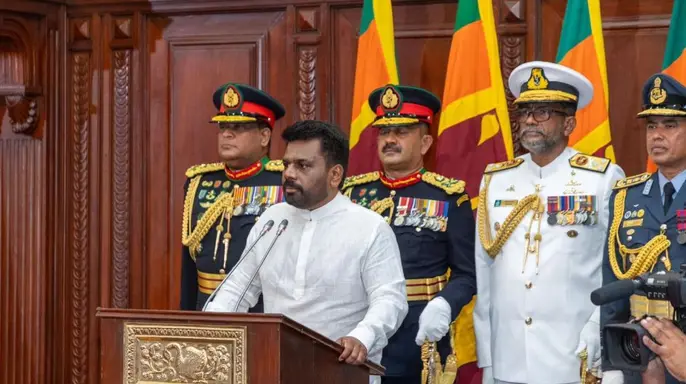Anura Kumara Dissanayake, leader of the People’s Liberation Front, a Marxist group, has officially taken office as the new president of Sri Lanka, a country of 22 million people. The 55-year-old Dissanayake defeated former President Ranil Wickremesinghe, who was widely criticized for leading the country into an economic crisis. His party, known for launching two armed insurrections in the 1970s and 1980s, now faces the immense task of steering Sri Lanka through its current financial difficulties.
A History of Rebellion
Dissanayake’s political journey has deep roots in the People’s Liberation Front (PLF), a Marxist group that led two violent uprisings decades ago. Despite this turbulent past, the PLF has gained support in recent years due to widespread dissatisfaction with traditional political parties. “We have deeply understood that we are going to get a challenging country,” Dissanayake said during his swearing-in ceremony. He emphasized the need for collective efforts to address the crisis, stating, “We don’t believe that a government, a single party, or an individual would be able to resolve this deep crisis.”
Economic Crisis and International Support
Sri Lanka’s political landscape has been in turmoil since the 2022 economic collapse, which saw inflation soar as high as 70% due to a severe dollar shortage. Many Sri Lankans, particularly in the Buddhist-majority nation, have expressed frustration with their political leaders as the country slowly climbs out of its economic downturn. “The nation’s GDP is expected to grow for the first time in three years,” Reuters said, signaling a slow but steady recovery.
International leaders, including Chinese President Xi Jinping, have extended their congratulations to Dissanayake. Xi expressed hope for continued cooperation, saying that China looks forward to working together “to carry forward our traditional friendship jointly.” The U.S. and India have also congratulated Sri Lanka, demonstrating global interest in its future.
A New Beginning After Political Unrest
Dissanayake’s inauguration marks the first standard power transfer in Sri Lanka since 2022 when massive protests forced former President Gotabaya Rajapaksa to resign and flee the country. After Rajapaksa’s departure, Wickremesinghe stepped in, but his tenure was marred by public discontent and economic hardships. Dissanayake’s victory is pivotal in Sri Lanka’s political history, offering hope for stability.
Facing Austerity and the IMF Agreement
One of the new president’s immediate challenges will be addressing Wickremesinghe’s austerity measures. These policies were part of a relief agreement with the International Monetary Fund (IMF), Sri Lanka’s largest creditor. Dissanayake campaigned on promises to ease these measures, appealing to voters who were struggling under the weight of economic reform. His ability to balance fiscal responsibility with relief for the population will be critical in determining the success of his presidency.
Anura Kumara Dissanayake’s leadership marks a new chapter for Sri Lanka, a nation that has faced political upheaval and economic hardship in recent years. With both domestic and international challenges ahead, Dissanayake will need to rely on the support of his party, global allies, and the Sri Lankan people to rebuild trust and steer the country toward recovery. As the world watches, only time will tell whether he can deliver on his campaign promises.







